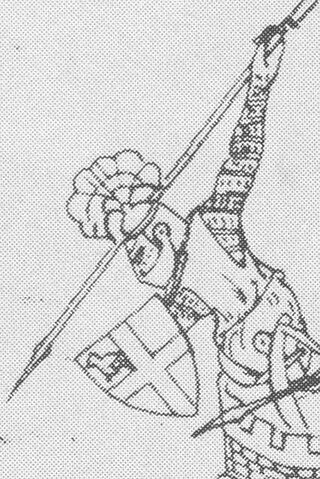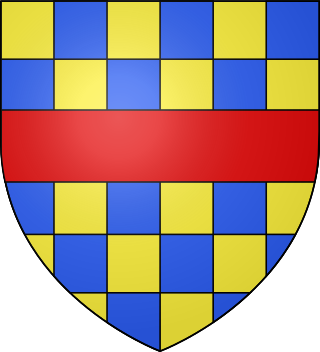
Magna Carta Libertatum, commonly called Magna Carta, is a royal charter of rights agreed to by King John of England at Runnymede, near Windsor, on 15 June 1215. First drafted by the Archbishop of Canterbury, Cardinal Stephen Langton, to make peace between the unpopular king and a group of rebel barons, it promised the protection of church rights, protection for the barons from illegal imprisonment, access to swift justice, and limitations on feudal payments to the Crown, to be implemented through a council of 25 barons. Neither side stood behind their commitments, and the charter was annulled by Pope Innocent III, leading to the First Barons' War.

Andrew Harclay, 1st Earl of Carlisle, alternatively Andreas de Harcla, was an important English military leader in the borderlands with Scotland during the reign of Edward II. Coming from a knightly family in Westmorland, he was appointed sheriff of Cumberland in 1311. He distinguished himself in the Scottish Wars, and in 1315 repulsed a siege on Carlisle Castle by Robert the Bruce. Shortly after this, he was taken captive by the Scots, and only released after a substantial ransom had been paid. His greatest achievement came in 1322, when he defeated the rebellious baron Thomas of Lancaster at the Battle of Boroughbridge on 16–17 March. For this he was created Earl of Carlisle.

Edward Stafford, 2nd Earl of WiltshireKB was an English nobleman.
Silvester de Everdon was a medieval Bishop of Carlisle and Lord Chancellor of England.
John de Halton, also called John de Halghton, was an English priest and Bishop of Carlisle from 1292 to 1324.

Walter Hungerford, 1st Baron Hungerford was an English knight and landowner, from 1400 to 1414 a Member of the House of Commons, of which he became Speaker, then was an Admiral and peer.
David A. Carpenter is an English historian and writer, and Professor of Medieval History at King's College London where he has been working since 1988. Carpenter specialises in the life and reign of Henry III. Historian Dan Jones described him as "one of Britain's foremost medievalists".

Sir Thomas Arundell of Wardour Castle in Wiltshire was a Cornish administrator and alleged conspirator.

John Clifford, 9th Baron Clifford, 9th Lord of Skipton was a Lancastrian military leader during the Wars of the Roses in England. The Clifford family was one of the most prominent families among the northern English nobility of the fifteenth century, and by the marriages of his sisters John Clifford had links to some very important families of the time, including the earls of Devon. He was orphaned at twenty years of age when his father was slain by partisans of the House of York at the first battle of the Wars of the Roses, the Battle of St Albans in 1455. It was probably as a result of his father's death there that Clifford became one of the strongest supporters of Margaret of Anjou, wife of King Henry VI, who ended up as effective leader of the Lancastrian faction.
Jocelin of Wells was a medieval Bishop of Bath. He was the brother of Hugh de Wells, who became Bishop of Lincoln. Jocelin became a canon of Wells Cathedral before 1200, and was elected bishop in 1206. During King John of England's dispute with Pope Innocent III, Jocelin at first remained with the king, but after the excommunication of John in late 1209, Jocelin went into exile. He returned to England in 1213, and was mentioned in Magna Carta in 1215.

Isabel de Bolebec, Countess of Oxford, was the eldest daughter and co-heiress of Hugh de Bolebec II, Lord of Whitchurch, Buckinghamshire, and his wife, Margaret de Montfichet. She married Robert de Vere, 3rd Earl of Oxford, and was a benefactress of the Order of Friars Preacher (Dominicans) in England.

Thomas Clifford, 8th Baron de Clifford, also 8th Lord of Skipton, was the elder son of John, 7th Baron de Clifford, and Elizabeth Percy, daughter of Henry "Hotspur" Percy and Elizabeth Mortimer.

Henry Clifford, 1st Earl of Cumberland KG was a member of the Clifford family which was seated at Skipton Castle, Yorkshire from 1310 to 1676.

Robert de Vere, hereditary Master Chamberlain of England, was the son of Aubrey de Vere, 1st Earl of Oxford, and Agnes of Essex. He succeeded his brother as the third Earl of Oxford, and was one of the twenty-five guarantors of Magna Carta.

Richard de Vere, 11th Earl of OxfordKG was the son and heir of Aubrey de Vere, 10th Earl of Oxford. He took part in the trial of Richard, Earl of Cambridge, and Lord Scrope for their part in the Southampton Plot, and was one of the commanders at Agincourt in 1415.

John Clifford, 7th Baron de Clifford, also known as John, Lord Clifford, 7th Lord of the Honor of Skipton, KG, was an English peer. He was killed at the siege of Meaux, France.

Thomas de Courtenay, 5th/13th Earl of Devon was a nobleman from South West England. His seat was at Colcombe Castle near Colyton, and later at the principal historic family seat of Tiverton Castle, after his mother's death. The Courtenay family had historically been an important one in the region, and the dominant force in the counties of Devon and Cornwall. However, the rise in power and influence of several gentry families and other political players, in the years leading up to Thomas' accession to the earldom, threatened the traditional dominance of the earls of Devon in the area. Much of his life was spent in armed territorial struggle against his near-neighbour, Sir William Bonville of Shute, at a time when central control over the provinces was weak. This feud forms part of the breakdown in law and order in England that led to the Wars of the Roses.
Michael Thomas Clanchy was Professor Emeritus of Medieval History at the Institute of Historical Research, University of London and Fellow of the British Academy.
Sir Henry Green was a courtier and councillor to king Richard II of England.

Thomas Basset, called Thomas Basset of Headington or Thomas Basset of Colinton, was an Anglo-Norman lord and royal counsellor to King John of England.










